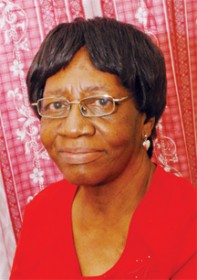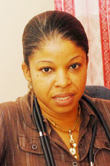Edna King – stage 4 breast cancer survivor talks with The Guyana Review about life after cheating death

Edna King is courage personified. At 72 she continues to fight for her life………..against cancer ………..and on the basis of the available evidence she has proven to be more than a match for the dreaded disease.
There is a blunt pragmatism to Edna’s demeanor that conceals the travails that she has had to ensure for some years. Her discovery of her breast cancer was a function of her own persistence. There was no lump in her breast at all. They had gone into the nodules under her arm and emerged as two lumps on her shoulder. “I went to the doctors and they said it was nothing. Still, I wanted to know why the two lumps were there, on my shoulders. They did not belong there. So I went to my surgeon.”
Esther remembers that her diagnosis of cancer galvanized her into action. She says that the surgeon simply examined the lumps on her shoulder and declared: “This is a big cancer. It is about ten centimeters and you will have to get rid of it.” Her response was pragmatism personified. “He said that I would have to have surgery and I said go ahead. Then he asked me when I would be ready. So I said I don’t know when you would be ready. He gave me all the instructions and he told me when he would be ready. I consulted no one else. The cancer had been there a while and it was already ten centimeters. My relatives were not too pleased but the surgery was successful.
By the time the cancer had been caught it was already in its fourth stage and Esther’s unhesitating decision probably saved her life. She has pondered whether or not the decision that led to the surgery that removed her breast was the correct one but her thoughts at the time were “do it and be finished.”

Dr. Vilma Perez the Cuban-born Associate Consultant at the Guyana Cancer Institute where Edna is a patient told Guyana Review that when Edna became an out patient at the Centre there was growing flesh around the scar from the operation. “In addition to that she had had the highest stage of cancer, stage four cancer and it had spread. “The first treatment she received was local radiation to kill the cancer cells. After that we recommended chemotherapy. After five weeks of that treatment the nodules went away, she started to look well and she did not want to continue the treatment. The treatment, Edna said, was making her tired.
Her decision not to continue was to cost her dear. “About six months after she refused to have the chemotherapy she came back coughing. We did an x-ray and found that the cancer had spread to her lungs. It was then that she decided to have the chemotherapy. She completed that treatment in June 2008 and since then there have been follow-ups every three months.
Edna says that one of the keys to the way in which she has handled the challenge of cancer is the fact that she has had no fear. “I have had no fear and in fact I even encourage people facing the same kind of problem. They come to the Cancer Institute and I see them moping. You have to talk about it and you have to believe that there is some help there for you.
A devout Christian and a regular churchgoer Edna says that while her ailment has slowed her down it has not changed her life style. “The last function I attended was a church outing at Belladrum. People with this problem should not stay in. You stay in and you get bogged down with the problem. God is not ready for me and my faith is going to carry me through until he is ready; and I intend to get around. I pull others out as well. Sometimes they want to stay in and I say come on, lets go.
Her children and other members of her family still ponder her outlook, her courage. “My children cannot understand. They took off when they learnt that I had the operation without consulting them. I went for the surgery then notified them.”
Dr. Perez has nothing but admiration for Edna. “Any female who is diagnosed with breast cancer and manages to complete the treatment deserves a medal. The treatment is extremely tough. Apart from the surgery there is the radiation treatment that lasts for five weeks then there are 8 cycles of chemotherapy that is administered every 21 days. And after all that is finished we still do not say you are free. You have to come to the Centre every three months for the first two years then every six months for the following two years. After that we usually say you are cancer-free. It is a long and difficult process.”
Apart from her loss of hair (that has been restored) and a sensation of numbness at the site of the wound Edna has had no side effects from he ailment. “I do not take on the numbness. I sew, cook and bake even though they (her children) do not want me to.”
Dr. Perez is buoyed both by Edna’s recovery and by her outlook. “We are trying to get cancer survivors to form a support group so as to provide patients undergoing treatment with the necessary support. The follow-up treatment sometimes lasts about five years and its tough for some patients. You have to have a strong mind in order not to become depressed.”
Cancer remains a dreaded disease, a malady that evokes fear and, up until now largely a medical riddle. Dr. Perez has her own views on the subject. “We have still not been able to determine the specific causes. Cancer can be related to several specific factors including genetics. What we do know is that if you have a history of breast cancer in the family you are more at risk of developing it. We haven’t yet found a cause.”
Asked whether she felt that nutrition may be a contributory factor to cancer Dr. Perez would only say that the use of beef is not recommended. “Beef takes a long time to digest and it is more toxic. We also recommend an avoidance of the use of fried foods. We recommend lots of vegetables, fish, chicken and eggs.”
The struggle to create a greater national awareness of cancer and the services available through the local health system is one of the preoccupations of the local Cancer Institute. Edna, for example was aware of the screening services offered long before her own grim discovery was made. “I was examining my own breasts and I felt no lumps. I went to two doctors and I found nothing. I didn’t know that I had to do mammograms. Those were done after the surgery.
When you have had the kind of life-changing experiences that Edna King has had you, understandably, become more philosophical. “My life has changed in all sorts of ways. I sit sometimes and remember my friends who have gone before me and again, if we had counseling things might have been different. Some would have accepted and some may not have accepted. But things would have been different. Take me, for example. Two lumps appeared on my shoulder and I went to two doctors. They said nothing was wrong. So what was I to do? I had no pain and the lumps on my shoulder did not grow. But then I asked myself what were they doing there and nobody counseled me about them.”
Despite her life-threatening experience Edna King still refuses to link her ‘lumps’ to cancer. “I don’t even connect the lumps to cancer. After the surgery they simply disappeared.”
Understandably, Edna has become a convert of the screening process. “I think that women must get themselves screened at an early age so that they can know what is going on. Like me, they may not feel anything but if they do the screening early they can go to the doctor and get follow-up action done.
We left Edna King transformed by her experience but self-assured and looking forward to life. She holds no dark thoughts about her experience or about the possibility of a recurrence of the disease. In fact, Edna King does not think of herself as a cancer survivor. She is simply too busy living her life.







